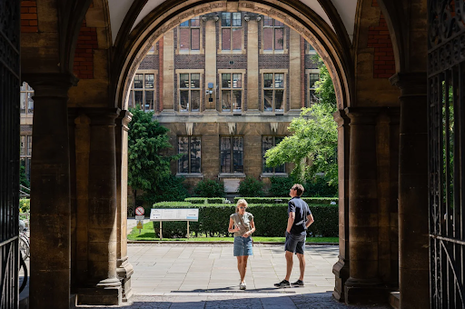Dons push back against Downing College’s ‘racist’ micro-aggression policy
Downing’s new anti-racist guidance encourages students to report micro-aggressions, prompting pushback from Dons who fear the policy will encroach on their free speech

As part of a recently published anti-racist policy, Downing College has advised students to report any instances of racism, including micro-aggressions, to College administration.
The document offers guidance on how to deal with racism in College, suggesting various supporting agencies in Cambridge and steps available for anyone who has been targeted by or witnessed racism.
The new policy comes following accusations by a Downing student that the College failed in its duty of care to her, following a series of Islamophobic incidents in her first year.
The article, which was published by Varsity in July, outlined these incidents, as well as what the student felt was a lacklustre response by College administration, and called on Downing to “recognise its failings and take steps towards what is right for its students and those it is responsible to”.
However, the guidance’s inclusion of micro-aggressions within its definition of racism has raised uproar amongst those afraid it will lead to a “culture of fear” within the College that is “antithetical to free speech”.
In a statement to Varsity, the College Master, Alan Bookbinder, said that it is “nonsense” to suggest that the new policy will create a culture of fear, and highlighted that it “eases the fears of victims and contributes to openness and mutual respect in College."
Bookbinder added that "freedom of speech is a vital right but it is not absolute. It is limited by law and it must not be used as a license to cause harm and offence.”
Racism is described in the document as “an ideology and a set of practices based on ideas of inherited white ‘racial’ superiority that normalises control, domination and exclusion over people of colour, while legitimating privilege and oppression.”
“One of the ways in which racism is perpetuated as a system of oppression”, it explains, is through micro-aggressions - defined as “everyday acts that serve to subjugate people of colour in more or less covert ways”.
Examples of micro-aggressions, outlined by the guidance, include asking ‘Where are you really from?’ as well as any other instance that “while apparently building inclusivity reinforce radicalised differences.”
“The main concern,” one Cambridge academic told the Telegraph, “is the definition of racism and the inclusion of micro-aggressions.”
By implying that it is impossible for anyone who is white - including Jewish, Polish and Irish people - to be a victim of racism, perturbed academics claim the document’s definition of racism is itself racist.
Philosophy lecturer Dr Arif Ahmed deemed the definition “divisive and inflammatory.”
“Any risk-averse white person will simply not engage with anyone from an ethnic minority, in case an innocent or well-meaning remark is overheard, misunderstood, and reported,” he added.
In response to criticism of the College’s new guidance, Downing College master Alan Bookbinder told the Telegraph that the policy covers all forms of discrimination and includes all races.
“Actual victims of racism in college are all from ethnic minorities,” he said, adding: “None of them are or have ever been white. Should that change, we would consider changing the guidance.
“Free speech does not apply to hate crime. Racist micro-aggressions are unacceptable in Downing and are not justified by free speech.”
Bookbinder has since told Varsity that the College intends to "improve the wording of [the] guidance on micro-aggressions." He added: "But we still strongly believe that students and staff must have clear routes for telling the College when they are racially abused."
Criticism of the College’s decision to advise students to report micro-aggressions mirrors the backlash that came in response to the University’s Report+Protect website, which was removed in May 2021 soon after it was first launched.
The site, which aimed to allow students and staff to anonymously or formally report inappropriate behaviour - including abuse, discrimination or misconduct - via a centralised system, was condemned as fostering an environment “akin to that of a police state”.
 News / Judge Business School advisor resigns over Epstein and Andrew links18 February 2026
News / Judge Business School advisor resigns over Epstein and Andrew links18 February 2026 News / Gov grants £36m to Cambridge supercomputer17 February 2026
News / Gov grants £36m to Cambridge supercomputer17 February 2026 News / Union speakers condemn ‘hateful’ Katie Hopkins speech14 February 2026
News / Union speakers condemn ‘hateful’ Katie Hopkins speech14 February 2026 News / CUCA members attend Reform rally in London20 February 2026
News / CUCA members attend Reform rally in London20 February 2026 News / Right-wing billionaire Peter Thiel gives ‘antichrist’ lecture in Cambridge6 February 2026
News / Right-wing billionaire Peter Thiel gives ‘antichrist’ lecture in Cambridge6 February 2026










